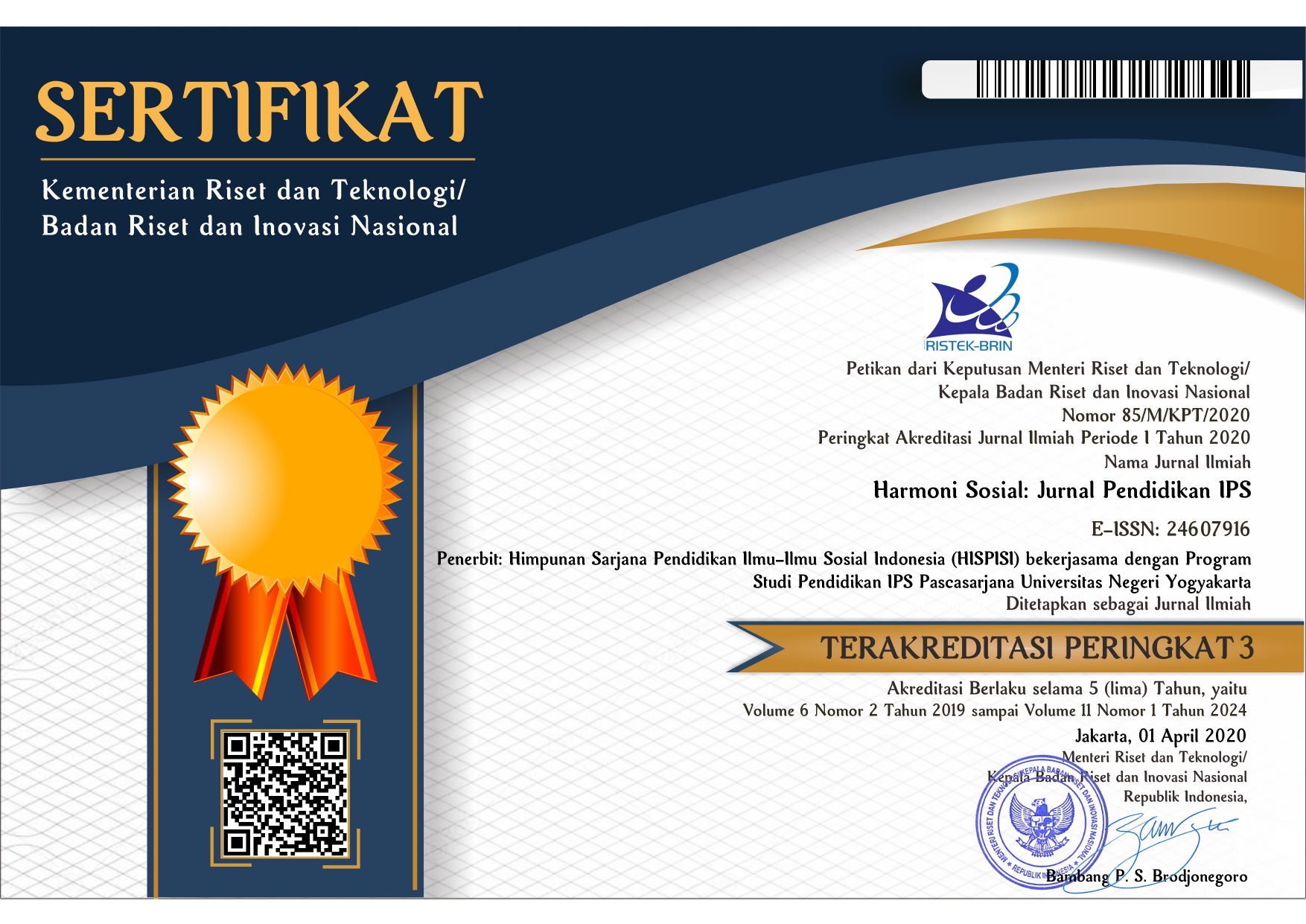Psychosocial implementation of the community in the christian religious education praxis of Dayak Ngaju family
Abstract
Every tribe has a unique way of passing their culture to their descendants. So do Dayak Ngaju Tribe. Dayak Ngaju is the name of the most extraordinary tribe in Center Borneo. In the past, they live within people groups in Huma Betang. Huma Betang is the name of Dayak Ngaju Houses at once but as a philosophy of Dayak Ngaju. Huma Betang contains 100 - 150 people and is an extraordinary place for Dayak Ngaju people because they do all their social activities as a family and as a part of society in this place. Elderly people in Huma Betang teach their Children about culture or tradition, beliefs, norms, etc in Huma Betang. This fact gives ample opportunity for Christian Education since Christianity became the majority religion in Dayak Ngaju to teach the Dayak Ngaju People Group about faith in Christ. This article uses the qualitative descriptive method to describe how Dayak Ngaju people's psychosocial condition can give them a big opportunity to implement Christian education in their families, especially in the Huma Betang context. This research can help in developing an appropriate psychosocial approach model for implementing Christian religious education among Ngaju Dayak families. This involves understanding how individual and group psychology in Ngaju Dayak society influences the acceptance and effectiveness of Christian religious education.
Keywords
References
Aditya, A., Wulandari, C., & Aryani, F. D. (2023). Dayak Ngaju Traditional Marriage, Central Kalimantan: Concept and Juridical Review. Pena Justisia: Media Komunikasi Dan Kajian Hukum, 21(1).
Ali, M. J. (2017). Mengenal Rumah Tradisional di Kalimantan. Rawamangun: Badan Pengembangan dan Pembinaan Bahasa Jalan Daksinapati Barat IV.
Anwar, K. (2022). Implementasi Kurikulum Muatan Lokal Keagamaan Dalam Pembentukan Budaya Religius di SMPN 2 Ngoro Jombang. Ilmuna: Jurnal Studi Pendidikan Agama Islam, 4(2), 173–190.
Apandie, C., & Ar, E. D. (2019). Huma Betang: Identitas Moral Kultural Suku Dayak Ngaju Kalimantan Tengah. Journal of Moral and Civic Education, 3(2), 76–91. https://doi.org/10.24036/8851412322019185
Behrer, M. (2011). How Cool Brands Stay Hot: Branding to Generation Y. London: Kopan Page.
Budiman, S., Yelicia, & Wenas, M. L. (2021). Filosofi Huma Betang Suku Dayak Ngaju sebagai Upaya Pembinaan Gereja secara Kontekstual Berdasarkan Kisah Para Rasul 2:42-47. Da’at: Jurnal Teologi Kristen, 2(Januari), 1–15.
Dewi, M. D. (2018). Agama dan Kebudayaan Kaharingan Di Kalimantan Tengah Menurut Para Penulis Indonesia (1990-2013). Uin Syarif Hidyatullah Jakarta.
Elbas, L. (1986). Arsitektur Tradisional Daerah Kalimantan Tengah. Jakarta: Departemen Pendidikan dan Kebudayaan.
Georgiou, A. (2022). Local Communities as Cultural Entrepreneurs: A Methodological Reflection on the Study of Community-Based Enterprises. In Cultural Entrepreneurship: New Societal Trends (pp. 85–93). Springer.
Habermas, R. T. (2009). Introduction to Christian Education and Formation: A Lifelong for Christ-Centered Restoration. Grand Rapids: Zondervan.
Jeynes, W. (2018). The Wiley Handbook of Christianity and Education. Hoboken: Wiley Blackwell.
Kurian, G. T., & Lamport, M. A. (2021). Encyclopedia of Christian Education. London and New York: Rowman & Littlefield.
Kusumawardhani, F. E. (2021). Efektivitas Pembelajaran Berbasis Daring bagi Mahasiswa Pendidikan Keagamaan Katolik Universitas Sanata Dharma Yogyakarta di Masa Pandemi Covid-19. Universitas Sanata Dharma.
Kwirinus, D., & Saeng, V. (2023). Ancestral Beliefs, Religious Systems and Views of Life Traditional Dayak Community. Jurnal Penelitian Ilmu-Ilmu Sosial, 4(1), 13–35. https://doi.org/10.23917/sosial.v4i1.1628
Lastaria, L., & Azzakiyah, L. F. (2022). PALI DALAM AKTIVITAS SEHARI-HARI SUKU DAYAK NGAJU DESA MANTANGAI HULU KABUPATEN KAPUAS (Pali in the Daily Activities of Dayak Ngaju Village of Exgai Hulu Kapuas Regency). SAWERIGADING, 28(2), 119–129.
Mariyati, L. I., & Rezana, V. (2021). Buku Ajar Psikologi Perkembangan Manusia I. Sidoarjo: Umsida Press.
Normuslim, N. (2018). Kerukunan Antar Umat Beragama Keluarga Suku Dayak Ngaju di Palangka Raya. Wawasan: Jurnal Ilmiah Agama Dan Sosial Budaya, 3(1), 66–89. https://doi.org/10.15575/jw.v3i1.1268
Nur, I. (2022). Religious Education Based Of Local Wisdom “Satu Tungku Tiga Batu” In Fak-Fak Community West Papua. Al-Ishlah: Jurnal Pendidikan, 14(4), 6631–6642.
Nurhajarini, D. R. (2010). Gemeente Pasuruan 1918-1942. Jantra, V(10), 819–934.
Pazmino, R. W. (2008). Foundational Issues in Christian Education. Grand Rapids: Baker Academic.
Putri, D. L., Subiyanto, A., Diponegoro, U., & Dayak, B. (2023). Konstruksi Verba Serial Direksional pada Bahasa Dayak Ngaju Kalimantan Tengah Construction of directional serial verbs in the Dayak Ngaju language of Central Kalimantan Pendahuluan Kalimantan Tengah merupakan provinsi terbesar kedua setelah Kalimantan Tim. 6, 413–424.
Ramdani, M. R. (2023). Nilai Sosial Kearifan Lokal Manugal Suku Dayak.
Romlah, L. S., Rahmatika, Z., Purnama, R., & Hakim, I. U. (n.d.). Mengintegrasikan Kecintaan Budaya Lokal dan Moderasi Beragama melalui Kurikulum Muatan Lokal.
Sakerebau, J. (2018). Memahami Peran Psikologi dalam Pendidikan Pembelajaran. BIA’: Jurnal Teologi Dan Pendidikan Kristen Kontekstual, 1(1), 96–111.
Seifart, K., & Sutton, R. (2009). Educational Psychology (Vol. 5). https://doi.org/10.1146/annurev.ps.05.020154.002041
Siagian, F. E. (2021). Direct Health Education by Christian Doctors: Sharing Experiences during Community Service in Local Church Communities in Jakarta, Indonesia. Journal of Complementary and Alternative Medical Research, 15(3), 36–41.
Siyoto, S. (2015). Dasar Metodologi Penelitian. Yogyakarta: Literasi Media Publishing.
Stuart-Buttle, R., & Shortt, J. (2018). Christian Faith, Formation and Education. https://doi.org/10.1007/978-3-319-62803-5
Tye, K. B. (2000). Basics of Christian Education. Missouri: Chalice.
Widen, K. (2009). Organisasi Sosial Lokal Sukubangsa Dayak Ngaju Di Kalimantan Tengah. Jakarta: Dirjen Nilai Budaya, Seni dan Film Departemen Kebudayan dan Pariwisata.
DOI: https://doi.org/10.21831/hsjpi.v9i2.49316
Refbacks
Copyright (c) 2024 Harmoni Sosial: Jurnal Pendidikan IPS

This work is licensed under a Creative Commons Attribution-ShareAlike 4.0 International License.
Our journal indexed by:
Printed ISSN (p-ISSN): 2356-1807 | Online ISSN (e-ISSN): 2460-7916
 This work is licensed under a Creative Commons Attribution-ShareAlike 4.0
This work is licensed under a Creative Commons Attribution-ShareAlike 4.0


















